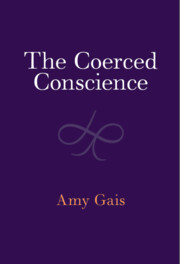Book contents
- The Coerced Conscience
- The Coerced Conscience
- Copyright page
- Dedication
- Epigraph
- Contents
- Acknowledgments
- A Note on Texts and Abbreviations
- 1 A New Kind of Politics?
- 2 John Milton and Expressive Conscience
- 3 Thomas Hobbes and Instilled Conscience
- 4 Baruch Spinoza and Conscientious Speech
- 5 Pierre Bayle and Tormented Conscience
- 6 The Politics of Conscience
- Bibliography
- Index
2 - John Milton and Expressive Conscience
Published online by Cambridge University Press: 07 December 2023
- The Coerced Conscience
- The Coerced Conscience
- Copyright page
- Dedication
- Epigraph
- Contents
- Acknowledgments
- A Note on Texts and Abbreviations
- 1 A New Kind of Politics?
- 2 John Milton and Expressive Conscience
- 3 Thomas Hobbes and Instilled Conscience
- 4 Baruch Spinoza and Conscientious Speech
- 5 Pierre Bayle and Tormented Conscience
- 6 The Politics of Conscience
- Bibliography
- Index
Summary
John Milton argues that liberty of conscience requires the freedom to express one’s innermost commitments to others, specifically in speech and writing. Hypocritical conformity robs individuals of crucial opportunities to foster political capacities of citizenship, specifically the skill of independent judgment. Milton hints at an intuition that other early modern figures will later foreground – that hypocritical conformity to the state religion hardens dissenters and makes them incapable of being judicious political citizens. If individuals live in a political society that does not afford them liberty of conscience, they will slowly lose the capability to exercise their conscience over time. This freedom requires a robust view of freedom and agency in the public sphere, since it implies far more than an inward freedom of conviction. Conscience must be cultivated independently of political and ecclesiastical authorities and requires confrontation with other individuals in the public sphere, implying the open exchange of ideas and the freedom to express one’s ideas publicly in writing or speech. Milton insists that the circulation of ideas in print allows for an extended opportunity for individuals to exercise their conscience, as the written word persists over time longer than speech, which dissipates in the immediate moment, only to be recounted by witnesses. Liberty of conscience is so crucial to Milton’s understanding of freedom that he describes it as the highest liberty above all liberties, even justifying other political freedoms.
Keywords
Information
- Type
- Chapter
- Information
- The Coerced Conscience , pp. 22 - 40Publisher: Cambridge University PressPrint publication year: 2023
